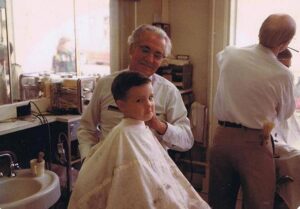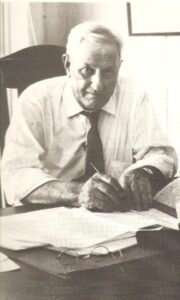With cash and a nod, I paid Sneed for the supplies and walked out the hardware store door and went left into a drizzling afternoon. For safety’s sake, inspecting the patch of pavement where Jackson runs into, or out of, the Square, off the curb I stepped. And raising my head walked straight into a black and white photograph of black and white Oxford. And, there, is the way it was for that split second and the split down through the decades. The best that can be said is, there were many fair people living in a unfair time.

And whoever said a picture can say a thousands things was thinking too much about too many things. A snapshot in time, and that’s all any of them are, of Oxford moving through one winter’s afternoon speaks in a common language. This, or any quality glimpse, need only speak singularly as it evokes heart to the heart. And if it does, then that’s everything. But, no one ever said all things heartfelt are rose-colored. The vision records any small Southern town of the times, it just happens to be Oxford, Mississippi. But Oxford just happens to be special. We have suffered deeper and soared back farther than most. And through an unfair time, the men who led and were led, all white, were more fair than not. Or we never would have come so far, after so much. My grandfather Stearns had been a fair man, and raised my daddy the same. Both gone now as I focus on the now.
All on the outside, black women with coats and scarves pulled tight, tending to and minding their business. Some dude, a kid we once recognized in the mirror, is hustling along, forever looking back for me. Warm on the inside, a full compliment of white shirted, bow tied barbers work away their day moving along from one Rockwell poster pose to the next. Old Bud got a cut and’s about to head out, as I leave the present and watch my family roots spread out across this small patch of cold home concrete.
Cousin Ben, “Uncle Benny” to me, had been a real soldier. And myself being a ten year old victorious veteran of every war we’ve ever fought, my youth longed to live in his world. In the tow of a hero home for the holidays, the Army Supply Store was the only building on the Square that counted. Ordered to attention right there in that window behind “surplus,”…”Sir, yes sir!” shot out as pride exploded inside. Soldier Santa’s quick grip of lapels and smart popping down tight of that real new and real used Army jacket was a moment of pride that will revolve around that very spot on the Square and in my mind for as long as little boys long to salute real soldiers.

But with the war and my imagination’s enlistment served, I mustered out of that phase as Uncle came home from ‘Nam with no pretense of American praise. And after he wiped San Francisco’s spit of his face, and Aunt Matty saying he was never the same after that, she soothed and kissed his face and buried him too early in his best used Army jacket. Crying my way back to the cars, I didn’t need Dad’s often-sought-after war advice to know I was American proud of soldier Benny, that we still liked Henry, but I hated Jane.
The drum beats of war and reality echo through the ages and down onto the Square from Christman’s windows. Reality hears the strumming from the studio up the stairs where Grandma had me fetch cousin Joe and his five dollar guitar. My own short-lived Mrs. McCall conducted musical career had happened just down the sidewalk, but a million miles from Mr. Christman’s big cool studio vibe and vibes.
Joe fetched, we languished in the car while Grandma took care of her serious Savings & Loan business. And there were Civil War battles waged with lesser loyalties than Mrs. J. G. Stearns had for the square Square institution that, in her name, looked after her dead daddy’s and dead husband’s money. Aunts Sara and Matty say they’ll be a lot left over one day, if Brother Tuck, “don’t lose it all out to the Country Club card game.”
Back up those stairs my memory goes to a time when Lawyer Price and Grandpa had been Masons together. Had known some great mystical secrets and now only Price was alive to tell Grandma’s last secret. She hadn’t liked him, but trusted him. No mystery in my hindsight, Grandmother’s foresight had directed the two of us to town. Saying she righted a wrong, four chunks became three. Six weeks later she left to go with God, and after the relatives left to go home, we all climbed to see Price. Uncle Tuck led, the two older Aunts, and me in Dad’s stead, ascended to see how much hadn’t been lost. But Tuck’s gambling had cost him more than he had reckoned on. And as he led the one man charge back down Price’s steps, I sat there satisfied in my father’s stead knowing grandmother Stearns had been a fair women, and raised my daddy the same.
The big house on Lamar is still mine, with at least a tenth mortgaged to Sneed’s. Things fall off and I put them back on. I return to my father’s roots with each swing of his hammer. And still walking, halfway in the then, and half in the now, and partly in Park’s door, I nod past ole Bud leaving and plop down in a chair from my youth. Back the scissor snips lull me to many a time in the tow of my biggest hero. Father and son then, as now with my own two boys, renewed is a ritual right-of-passage. The workings of my town, the rumors of my childhood, the knowing how to talk, the knowing when to listen and the knowledge that these men, living in an unfair time, were more fair than not.

Photo courtesy J. R. Cofield, The Cofield Collection
Leaving Dad there, with cash and a nod I pay old Parks and walk straight out of this black and white shot of black and white Oxford; back and alone, I head home. But hoping to catch a last glimpse of him, I turn to look back as far as I can see. And there among that group of fair Oxford men, I see him every time. And all the while, whether here or there, then or now, all men are led by example.
William Faulkner wrote it straight up. He changed Oxford into Jefferson, changed Lafayette into Yoknapatawpha, changed little Billy Falkner into Nobel Laureate Faulkner, and changed us forever. But even William was led by, and criticized by, and Oxford the better for, the fair men who’s leadership both black and white would respected, could respect.
Blacks on the outside, whites on the inside, youth hustling along, music in the air, the title to my home given there, my eyes drift out of the mist of memory and upward. He was famous to us before his nephew added a extra letter to their name and took the town international. Above the chilly afternoon, above it all, in the single lit balcony window, working at his desk sits a fair man, old Judge J. W. T. “Uncle John” Falkner, Jr., himself. Small towns are only small is acreage. We have the luxury of only needing to look down and watch our family roots spread out across any glimpsed patch of cold home concrete.
 Courtesy of John Cofield, a HottyToddy.com writer and one of Oxford’s leading folk historians. He is the son of renowned university photographer Jack Cofield. His grandfather, “Col.” J. R. Cofield, was William Faulkner’s personal photographer and for decades was Ole Miss yearbook photographer. John also attended Ole Miss. Contact John at johnbcofield@gmail.com.
Courtesy of John Cofield, a HottyToddy.com writer and one of Oxford’s leading folk historians. He is the son of renowned university photographer Jack Cofield. His grandfather, “Col.” J. R. Cofield, was William Faulkner’s personal photographer and for decades was Ole Miss yearbook photographer. John also attended Ole Miss. Contact John at johnbcofield@gmail.com.
